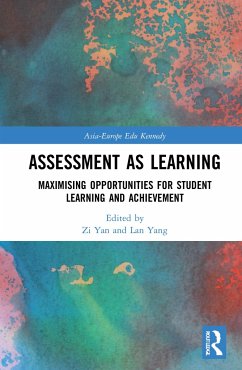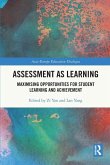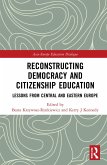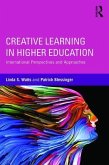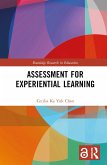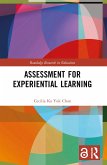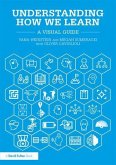Assessment as Learning
Maximising Opportunities for Student Learning and Achievement
Herausgeber: Yan, Zi; Yang, Lan
Assessment as Learning
Maximising Opportunities for Student Learning and Achievement
Herausgeber: Yan, Zi; Yang, Lan
- Gebundenes Buch
- Merkliste
- Auf die Merkliste
- Bewerten Bewerten
- Teilen
- Produkt teilen
- Produkterinnerung
- Produkterinnerung
Based on a solid theoretical basis of assessment-as-learning and updated empirical evidences, this timely book significantly expands the existing scope of assessment-as-learning typically developed in Western contexts.
Andere Kunden interessierten sich auch für
![Assessment as Learning Assessment as Learning]() Assessment as Learning42,99 €
Assessment as Learning42,99 €![Reconstructing Democracy and Citizenship Education Reconstructing Democracy and Citizenship Education]() Reconstructing Democracy and Citizenship Education180,99 €
Reconstructing Democracy and Citizenship Education180,99 €![Creative Learning in Higher Education Creative Learning in Higher Education]() Creative Learning in Higher Education63,99 €
Creative Learning in Higher Education63,99 €![Assessment for Experiential Learning Assessment for Experiential Learning]() Cecilia Ka Yuk ChanAssessment for Experiential Learning200,99 €
Cecilia Ka Yuk ChanAssessment for Experiential Learning200,99 €![Assessment for Experiential Learning Assessment for Experiential Learning]() Cecilia Ka Yuk Chan (Hong Kong The University of Hong Kong)Assessment for Experiential Learning53,99 €
Cecilia Ka Yuk Chan (Hong Kong The University of Hong Kong)Assessment for Experiential Learning53,99 €![Reconstructing Democracy and Citizenship Education Reconstructing Democracy and Citizenship Education]() Reconstructing Democracy and Citizenship Education42,99 €
Reconstructing Democracy and Citizenship Education42,99 €![Understanding How We Learn Understanding How We Learn]() Yana WeinsteinUnderstanding How We Learn36,99 €
Yana WeinsteinUnderstanding How We Learn36,99 €-
-
-
Based on a solid theoretical basis of assessment-as-learning and updated empirical evidences, this timely book significantly expands the existing scope of assessment-as-learning typically developed in Western contexts.
Hinweis: Dieser Artikel kann nur an eine deutsche Lieferadresse ausgeliefert werden.
Hinweis: Dieser Artikel kann nur an eine deutsche Lieferadresse ausgeliefert werden.
Produktdetails
- Produktdetails
- Asia-Europe Education Dialogue
- Verlag: Taylor & Francis Ltd
- Seitenzahl: 300
- Erscheinungstermin: 13. August 2021
- Englisch
- Abmessung: 240mm x 161mm x 21mm
- Gewicht: 594g
- ISBN-13: 9780367509972
- ISBN-10: 0367509970
- Artikelnr.: 62221618
- Herstellerkennzeichnung
- Libri GmbH
- Europaallee 1
- 36244 Bad Hersfeld
- gpsr@libri.de
- Asia-Europe Education Dialogue
- Verlag: Taylor & Francis Ltd
- Seitenzahl: 300
- Erscheinungstermin: 13. August 2021
- Englisch
- Abmessung: 240mm x 161mm x 21mm
- Gewicht: 594g
- ISBN-13: 9780367509972
- ISBN-10: 0367509970
- Artikelnr.: 62221618
- Herstellerkennzeichnung
- Libri GmbH
- Europaallee 1
- 36244 Bad Hersfeld
- gpsr@libri.de
Zi Yan is Associate Professor at the Department of Curriculum and Instruction, the Education University of Hong Kong. He is also the Co-Director of the Centre for Excellence in Learning and Teaching (CELT) and Associate Director of the Assessment Research Centre (ARC). His main publications and research interests focus on two related areas, i.e., educational assessment in the school and higher education contexts with an emphasis on student self-assessment; and Rasch measurement, in particular its application in educational and psychological research. He is currently leading the Key Research Area on Assessment Research To Improve Student-learning and Teaching (ARTIST) (https://www.eduhk.hk/artist) at the Education University of Hong Kong. Lan Yang is Assistant Professor at the Department of Curriculum and Instruction, the Education University of Hong Kong. She obtained her PhD degree from the University of Hong Kong in 2012 on examining the effects of performance feedback and a combination of performance and attributional feedback on enhancing Chinese students' academic self-concept and academic achievement. She was the recipient of the Global SELF Research Network Highly Commended PhD Award (2013) based on her PhD research. Her research focuses on harnessing the power of formative assessment from the perspective of psychology including a range of influential psychological constructs (e.g., self-concept, achievement emotions, learning engagement etc.). Recently, the Psychology and Assessment SIG led by Dr. Yang has been established under the KRA (https://www.eduhk.hk/artist), the Education University of Hong Kong.
1. Assessment
as
Learning in the Global Assessment Reforms Part I Revisiting Assessment
as
Learning from New Perspectives 2. Conceptualising Assessment
as
Learning 3. Assessment
as
Learning for the Development of Students' Evaluative Judgement 4. Assessments Cause and Contribute to Learning: If Only We Let Them 5. The Role of Feedback Orientation in Converting External Feedback to Learning Opportunities for Implementing Assessment
as
Learning in the Context of Feedback Part II Meeting the Challenge of Implementation 6. Interplay between Students' Perceived Utility, Accountability, Self
Efficacy and Social Awareness when Engaged with Peer Feedback: A Qualitative Interpretation 7. Designing Nested Tasks to Facilitate Students' Mega
Cognitive Development: Assessment
as
Learning Practice from Two Award
Winning University Teachers 8. Dancing with Chains: How Does Assessment
as
Learning Fit in China? 9. Fostering Student Evaluative Judgement through Assessment
as
Learning in Tertiary English Language Classroom 10. The Conceptualisation of Student Self
Assessment Literacy: A Case Study of Chinese Undergraduates 11. Assessment
as
Learning through the Lens of Self
Regulated Learning: The Role of Normative Competence 12. Involved and Autonomy
Supportive Teachers Make Reflective Students: Linking Need
Supportive Teacher Practices to Student Self
Assessment Practices 13. Changing External Feedback to Learning Opportunities: A Study on Filipino University Students' Feedback Orientation 14. Harnessing the Learning Potential of Feedback: Dedicated Improvement and Reflection Time (DIRT) in Classroom Practice 15. Synchronous Self
Assessment: Assessment from the Other Side of the Mirror 16. Supporting Quality of Learning by Letting Students Give their Own Grades
An Innovative Self
Assessment Model in University Mathematics 17. Supporting Students to Use Assessment
as
Learning 18. The Reciprocal Nature of Assessment
as
Learning and Feedback Literacy: Case Studies from Higher Education in Australia
as
Learning in the Global Assessment Reforms Part I Revisiting Assessment
as
Learning from New Perspectives 2. Conceptualising Assessment
as
Learning 3. Assessment
as
Learning for the Development of Students' Evaluative Judgement 4. Assessments Cause and Contribute to Learning: If Only We Let Them 5. The Role of Feedback Orientation in Converting External Feedback to Learning Opportunities for Implementing Assessment
as
Learning in the Context of Feedback Part II Meeting the Challenge of Implementation 6. Interplay between Students' Perceived Utility, Accountability, Self
Efficacy and Social Awareness when Engaged with Peer Feedback: A Qualitative Interpretation 7. Designing Nested Tasks to Facilitate Students' Mega
Cognitive Development: Assessment
as
Learning Practice from Two Award
Winning University Teachers 8. Dancing with Chains: How Does Assessment
as
Learning Fit in China? 9. Fostering Student Evaluative Judgement through Assessment
as
Learning in Tertiary English Language Classroom 10. The Conceptualisation of Student Self
Assessment Literacy: A Case Study of Chinese Undergraduates 11. Assessment
as
Learning through the Lens of Self
Regulated Learning: The Role of Normative Competence 12. Involved and Autonomy
Supportive Teachers Make Reflective Students: Linking Need
Supportive Teacher Practices to Student Self
Assessment Practices 13. Changing External Feedback to Learning Opportunities: A Study on Filipino University Students' Feedback Orientation 14. Harnessing the Learning Potential of Feedback: Dedicated Improvement and Reflection Time (DIRT) in Classroom Practice 15. Synchronous Self
Assessment: Assessment from the Other Side of the Mirror 16. Supporting Quality of Learning by Letting Students Give their Own Grades
An Innovative Self
Assessment Model in University Mathematics 17. Supporting Students to Use Assessment
as
Learning 18. The Reciprocal Nature of Assessment
as
Learning and Feedback Literacy: Case Studies from Higher Education in Australia
1. Assessment
as
Learning in the Global Assessment Reforms Part I Revisiting Assessment
as
Learning from New Perspectives 2. Conceptualising Assessment
as
Learning 3. Assessment
as
Learning for the Development of Students' Evaluative Judgement 4. Assessments Cause and Contribute to Learning: If Only We Let Them 5. The Role of Feedback Orientation in Converting External Feedback to Learning Opportunities for Implementing Assessment
as
Learning in the Context of Feedback Part II Meeting the Challenge of Implementation 6. Interplay between Students' Perceived Utility, Accountability, Self
Efficacy and Social Awareness when Engaged with Peer Feedback: A Qualitative Interpretation 7. Designing Nested Tasks to Facilitate Students' Mega
Cognitive Development: Assessment
as
Learning Practice from Two Award
Winning University Teachers 8. Dancing with Chains: How Does Assessment
as
Learning Fit in China? 9. Fostering Student Evaluative Judgement through Assessment
as
Learning in Tertiary English Language Classroom 10. The Conceptualisation of Student Self
Assessment Literacy: A Case Study of Chinese Undergraduates 11. Assessment
as
Learning through the Lens of Self
Regulated Learning: The Role of Normative Competence 12. Involved and Autonomy
Supportive Teachers Make Reflective Students: Linking Need
Supportive Teacher Practices to Student Self
Assessment Practices 13. Changing External Feedback to Learning Opportunities: A Study on Filipino University Students' Feedback Orientation 14. Harnessing the Learning Potential of Feedback: Dedicated Improvement and Reflection Time (DIRT) in Classroom Practice 15. Synchronous Self
Assessment: Assessment from the Other Side of the Mirror 16. Supporting Quality of Learning by Letting Students Give their Own Grades
An Innovative Self
Assessment Model in University Mathematics 17. Supporting Students to Use Assessment
as
Learning 18. The Reciprocal Nature of Assessment
as
Learning and Feedback Literacy: Case Studies from Higher Education in Australia
as
Learning in the Global Assessment Reforms Part I Revisiting Assessment
as
Learning from New Perspectives 2. Conceptualising Assessment
as
Learning 3. Assessment
as
Learning for the Development of Students' Evaluative Judgement 4. Assessments Cause and Contribute to Learning: If Only We Let Them 5. The Role of Feedback Orientation in Converting External Feedback to Learning Opportunities for Implementing Assessment
as
Learning in the Context of Feedback Part II Meeting the Challenge of Implementation 6. Interplay between Students' Perceived Utility, Accountability, Self
Efficacy and Social Awareness when Engaged with Peer Feedback: A Qualitative Interpretation 7. Designing Nested Tasks to Facilitate Students' Mega
Cognitive Development: Assessment
as
Learning Practice from Two Award
Winning University Teachers 8. Dancing with Chains: How Does Assessment
as
Learning Fit in China? 9. Fostering Student Evaluative Judgement through Assessment
as
Learning in Tertiary English Language Classroom 10. The Conceptualisation of Student Self
Assessment Literacy: A Case Study of Chinese Undergraduates 11. Assessment
as
Learning through the Lens of Self
Regulated Learning: The Role of Normative Competence 12. Involved and Autonomy
Supportive Teachers Make Reflective Students: Linking Need
Supportive Teacher Practices to Student Self
Assessment Practices 13. Changing External Feedback to Learning Opportunities: A Study on Filipino University Students' Feedback Orientation 14. Harnessing the Learning Potential of Feedback: Dedicated Improvement and Reflection Time (DIRT) in Classroom Practice 15. Synchronous Self
Assessment: Assessment from the Other Side of the Mirror 16. Supporting Quality of Learning by Letting Students Give their Own Grades
An Innovative Self
Assessment Model in University Mathematics 17. Supporting Students to Use Assessment
as
Learning 18. The Reciprocal Nature of Assessment
as
Learning and Feedback Literacy: Case Studies from Higher Education in Australia

